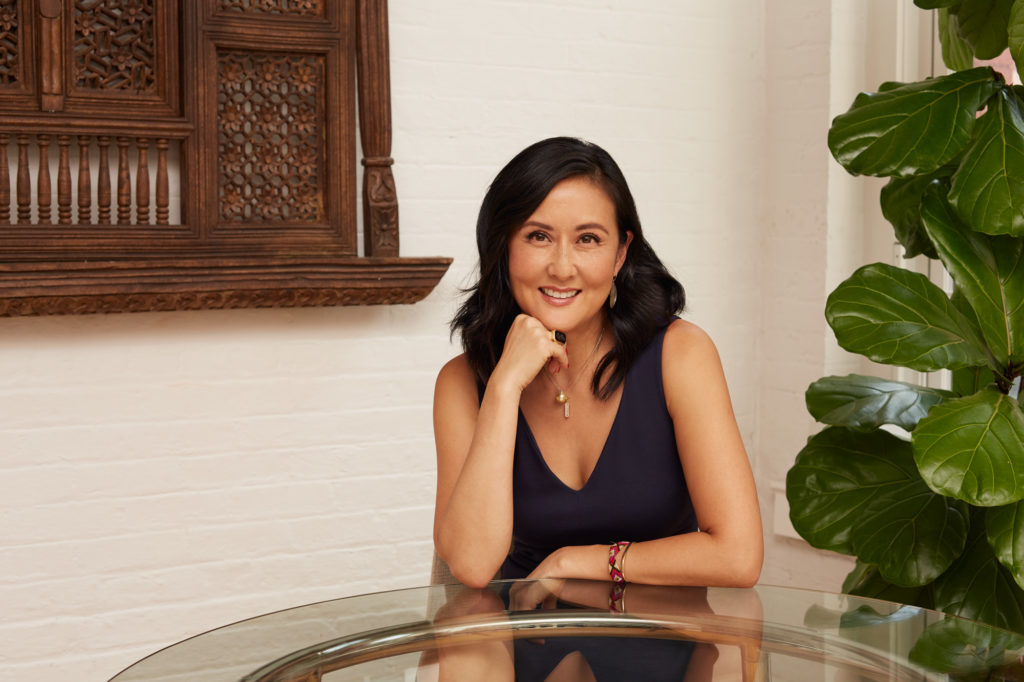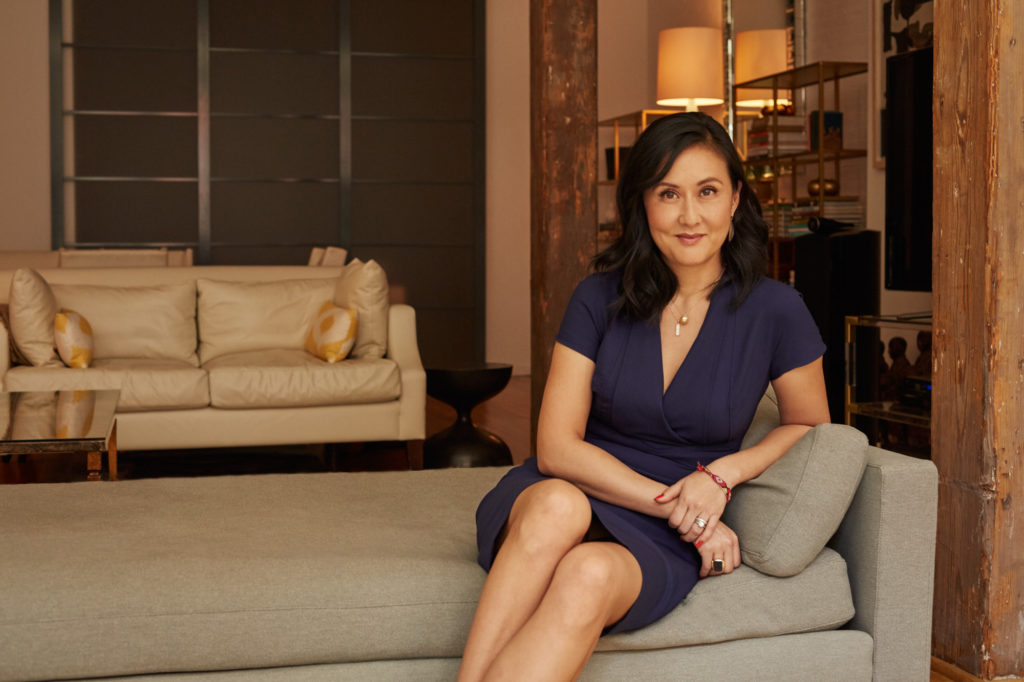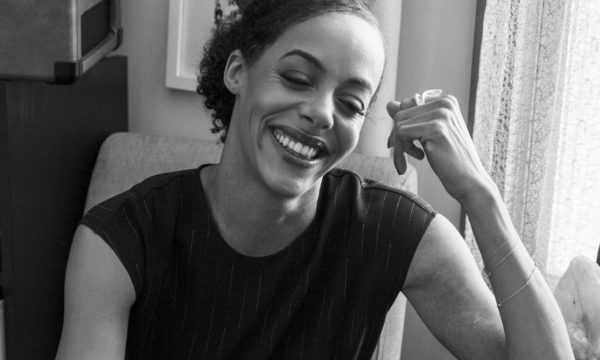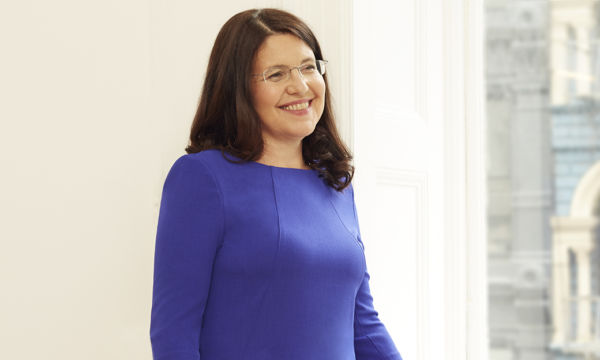TED’s Lisa Choi Owens: Pay Attention to What Keeps You Up at Night
July 21, 2017 | Filed in: Woman of the Week
If you’ve ever wondered what it’s like to work at TED, the company behind the constant stream of inspiring conferences and viral presentations, Lisa Choi Owens can tell you that it’s just as cool as it sounds. (And she rides a scooter to her office every day from her TriBeCa apartment, so… this is a woman who knows how to live.) As TED’s chief revenue officer and head of global partnerships, she works with companies and organizations around the world to help them develop their own versions of TED talks, which means that her job is to facilitate the spread of brilliant ideas. Here, she shares tricks for good public speaking, how to deliver a great talk, and the importance of bedtime stories.
I WISH I’D HAD A GRAND PLAN, but I definitely didn’t. My parents were immigrants, and so I didn’t have standard role models from a career perspective. They were the typical American dream; they came here with $800, no college education, nothing. Eventually they owned motels, a dry cleaner, and a snack shop. My dad, in small ways, was an entrepreneur himself, and watching him take control of his life in that way was an interesting thing to grow up with. As a result, I think I always had a mind for business.
MY SISTER AND I WERE TAUGHT that education was critical, and we both ended up with graduate degrees. I also worked throughout school—out of necessity, but it helped my career, too. I had tons of internships, and I worked at an accounting firm. I was just looking for a high-paying job and a good-looking career trajectory, and made my way to Wall Street after college. It didn’t last, but it was a good jumping-off point. I was on a trading floor, and it was a harsh reality. Though it was interesting to understand capital markets and the underpinnings of our economy, it was not—particularly back then—a friendly place for women. I had the gift of good friends who said, “Just because you’re in it doesn’t mean you need to stay.” It was a soul-searching moment. In your early 20s, it’s not easy to say, “Maybe this career path is not right for me. Maybe I need to move on.”

Lisa wears the Bourgeois blouse in chili flake and the Oshima pant in black.
LEARNING THE VALUE OF NETWORKING at an early age was critical. I think a lot of women aren’t as primed for professional networking as men are. In my case, it got me my next job: A friend of mine on Wall Street had taken Tommy Hilfiger public, so I wound up working there. It’s a very odd thing to go from JP Morgan to fashion, but it was a great experience. I learned how to make something and sell it, which was fascinating.
I WENT TO Harvard Business School after that, and then the internet happened and that was it for me. I graduated during a time when it was frothy, and the world was changing in ways that nobody was anticipating. The business school was changing its curriculum. Recruiters didn’t know what to do. It was nothing but promise, and I took that leap of faith even though I wasn’t really a technical person. The path from finance to fashion to tech was a combination of being opportunistic and knowing a set of people who were motivated and fun but also smart and ambitious, and being around that ambition made me a little bit more ambitious, too.
I HAD THE FORTUNE AND MISFORTUNE of going through an IPO right before the tech bubble burst in 2000. The excitement and energy of being at a company that’s about to go public—it’s an experience I wish everyone could go through. That’s also an incredible learning curve, and I worked like an animal. And then the bubble burst in March 2000. It was a really, really bad moment, and definitely an eye-opener—don’t count your chickens before they’ve hatched. Having a lesson like that, early on in my career, was sobering and valuable. Luckily, I didn’t have much at risk; I didn’t have school debt, I was in my 20s, and I didn’t have children yet. It still wasn’t an easy process, but I don’t think many people have the opportunity to see that cycle right up close, front-and-center, and are able to walk away.
TED WAS NOT A COMPANY that I would have thought about working for until I went on a leadership retreat in Ecuador and tapped into a completely new circle of people. That was an enormous lesson: Stepping out of your comfort zone is a) fulfilling and makes your life more fun and interesting, and b) professionally rewarding, because it shows you different paths and different kinds of companies with different sectors. At that point, I was working at big TV network, and TED would have never occurred to me. It was through those new connections, a bunch of serendipity, and opening my eyes to a slightly different path that brought me to TED. It’s been an incredible gift.

Lisa wears the Rachel dress in midnight blue.
MY ROLE AT TED is chief revenue officer and head of global partnerships, which means I’m responsible partially for the funding of the company. TED is a non-profit, so there are different revenue streams to fund the mission, which is to spread ideas globally. Some comes through conferences, but a big portion of it comes from the work that my group does. We work with companies to create both online and event experiences that encourage idea-sharing similar to TED experiences. Everything we do for our big flagship conferences, that’s all repeatable for organizations and companies. We help them create stories and story-tell. It’s always mission-driven, and never overly commercial.
WE TALK TO EVERY TYPE OF COMPANY on the planet, every type of industry, and each one is way more interesting than you ever thought. That’s the greatest thing about working at TED; you learn, “Oh my God, everything is interesting.” Typically, I start by asking the standard “What keeps you up at night?” Usually the answer to that question is not, “How do I launch this product successfully?” It’s something like: “We’re being disrupted by technology. How do I keep people motivated? How do I inject innovative thinking into a legacy company?” It’s those kinds of hairy topics you put off to the side, because they’re hard to address, that we want people to talk about. It’s almost always about culture. If you can’t motivate people inside your company, how are you going to motivate people outside to care about what you do? That’s usually what I ask, and it almost immediately lights people up. They often grimace.
THERE IS NO FORMULA to preparing a TED talk, but it’s been so cool to draw back the curtain and see how it works. First, is it an idea or a story? A lot of people have stories they want to share, but there needs to be a distinct idea you’re trying to get across. That is a discipline, and it takes a lot of work, to separate the idea from the story. The second question we ask people is why they’re the best person to share that idea. Are they legitimately equipped, and do they have the relevancy and the chops to do it? It’s content first, and your relationship to that content, and it’s discipline.
ANOTHER TRICK TO GIVING A GOOD TALK is to make sure that it’s in your own words and natural language, which can be hard. Have a point of view, and some element of storytelling that says, “This is my real life experience. Did you have one like that?” It helps to provide your own relationship to it, which gives a more authentic feeling and helps someone feel a connection. We are also big proponents of memorizing and not reading, because eye contact is super important. You stand differently when you’re projecting out versus looking at note cards or a Powerpoint deck and constantly turning around. When it comes to visuals, use images, not a lot of words, that invoke feeling. People remember feeling. Good public speaking is unfussy and uncomplicated, and you need to dress in a way that is absolutely you. There is no uniform, and the range is tremendous. When people are giving a talk, they sometimes dress in a way that is more casual than I would choose, but that is what they’d prefer to be in. You have to be as present as possible. The minute you’re adjusting and feel like you can’t move, you’re distracted and not present, and not connecting with people.
THE MOST IMPORTANT PIECE of advice for a good talk is boring: It’s just preparation. The best people have written and rewritten their talks, and they have memorized and repeated it over and over. There’s a visible distinction between the ones who have done it 70 times versus the one who’s done it twice.

Lisa wears the Emma dress in galaxy blue.
I’VE INVESTED MY OWN TIME and resources into taking classes in leadership and trying to manage stress. The pace of everything is exhausting. People are all motivated differently, and you can’t manage them in one fell swoop. There’s no paintbrush you can use to get everyone to work at their best. 80 percent of my job is HR on some level. How do you get people to feel like they’re developing? How do you delegate and manage to the right amount of detail? How do you provide feedback and teach people to receive feedback? Those are all things I had to learn, and I wish more people would spend the time to do them because I don’t think they come naturally.
AS A BOSS, I’m firm but supportive. One of the things I always try to do is to provide context. No matter what your job is, there will be parts of it that you might think are rote or seem beneath you. But I like people to know why that part is still important, and part of something bigger, so I provide the backstory: “These are the reasons we have to do this,” versus “‘Just get this done, go.” It boils down to purpose. If I don’t give someone a reason to do something, they won’t do it well.
I’M PRETTY GOOD AT NOT DOING EMAIL when I get home. I try to get home by 7:00 p.m. to spend some amount of quality time with my kids. It’s not a meal, because they eat earlier than me, but I want to hear about their day. I read to them. They’re nine and 11, so they’re kind of old for it, but it’s our thing. I try to put them to bed at 8:30, and then I really do need to unwind. I want to create a culture where people don’t feel like they need to respond to me at 9:00 p.m. at night. For me, unwinding means disconnecting. That’s the single hardest thing we have to do. We are being manipulated by technology, and turning it off—not constantly checking devices—is a muscle we have to exercise. Don’t get me wrong—I’m totally into technology, and it improves our lives so much—but there are other things to which it can do a disservice if not managed.
Photographs by Maria Karas.








